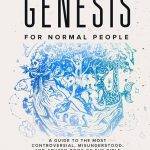Re-reading the story of Adam and Eve

I’m not entirely sure what to make of Peter Enns’ and Jared Byas’ take on the story of Adam and Eve. But I offer a synopsis here, since it is certainly worth pondering.
Many of us have been taught that Adam and Eve were created perfect, but then ‘fell’ into sin, taking the entire human race with them.
But some – including those from the Eastern Orthodox tradition – take a different angle. In this reading, the story is not about a fall from sinless perfection, but rather a failure to grow up into godly wisdom.
As such, the Adam story stands as a preview of Israel’s story.
Why were Adam and Eve forbidden to eat the fruit of the tree of the knowledge of good and evil? Of course, the knowledge of good and evil was the whole point of the OT law. If Israel obeyed God’s law, they would get to stay in the land. If they did disobeyed the law, they would forfeit the land.
The book of Proverbs makes a similar point. Following God’s path leads to wisdom and life (Prov 8:35). Following the path of foolishness leads to death (Prov 8:36).
The knowledge of good and evil, then, is not wrong. But such knowledge must be acquired God’s way, not our own. Obedience is the great prerequisite (Prov 1:7). We cannot simply help ourselves to this knowledge. There is no short cut:
‘True knowledge can only be gained by submitting to God, trusting, revering, and loving him (all included in that phrase “‘fear the Lord”).’
No wonder that Prov 3:18 says that Wisdom is ‘a tree of life to those who lay hold of her’.
For both Adam and Israel, failure to follow God’s path of wisdom led to death, in the form of estrangement from God and exile (from the garden and from the land).
What about the crafty serpent (Gen 3:1-7)? Much of Proverbs is about teaching young people to be shrewd in thought, word and action (see Prov 1:4). But, always, there is a crafty alternative waiting to take them in and drive them from wisdom (and life) towards foolishness (and death). Note: ‘shrewd’ and ‘crafty’ translate the same word in Hebrew.
Like a craft used-car saleman the Serpent outwits Eve with half-truths:
“Trust me, lady. God’s lying to you. He’s even a bit jealous. The reason God doesn’t want you to eat of that wonderful, beautiful, delicious tree is because he knows that when you eat from it, you will become God-like yourself, knowing good and evil.”
Of course, God wants people to be like him. But in his own way and time. The serpent tricks Eve into making a grab for wisdom by by-passing God’s instruction. The couple do grow up (indicated by their feeling shame in their nakedness), but without having learned that true wisdom is inseparable from obedience. They have taken the path that leads to death.
Listen to God and follow his ways and you will live. This point is made in the form of myth (the Adam and Eve story), in the form of wisdom literature (the book of Proverbs) and in the form of historical narrative (the story of Israel).
Just as Adam was expelled from the garden, Israel was expelled from the land. But in 539 BC, after fifty years of exile, Israel does return to the land. Israel’s dead bones are brought back to life (Eze 37; Isa 40:2).
Here, then, is a God who will not let his chosen people completely go. He will redeem them and cause them once agan to walk the path of wisdom and of life.
Based on
Enns, Peter; Byas, Jared. Genesis for Normal People. Chapter 4